When you start your own business, you quickly realize the wide array of different tasks you’ll need to get off the ground to be successful. While this can be overwhelming, time tracking software for small businesses can help you stay organized and see how much time you’re spending on each task.
Boost your team’s efficiency with Hubstaff's productivity tools
Why does a small business need time-tracking software?
For small businesses, even the smallest added costs can break the bank. That said, while time tracking software certainly costs you on a month-to-month basis, it more than offsets the costs of inaccurate timesheets and invoices.
That’s where we come in. We’re committed to helping you find a time tracking tool for small businesses that’s tailor-made for your unique requirements. In this post, we’ll explore industry-leading tools by comparing features, cost, setup, and implementation. Let’s get started!
1. Hubstaff
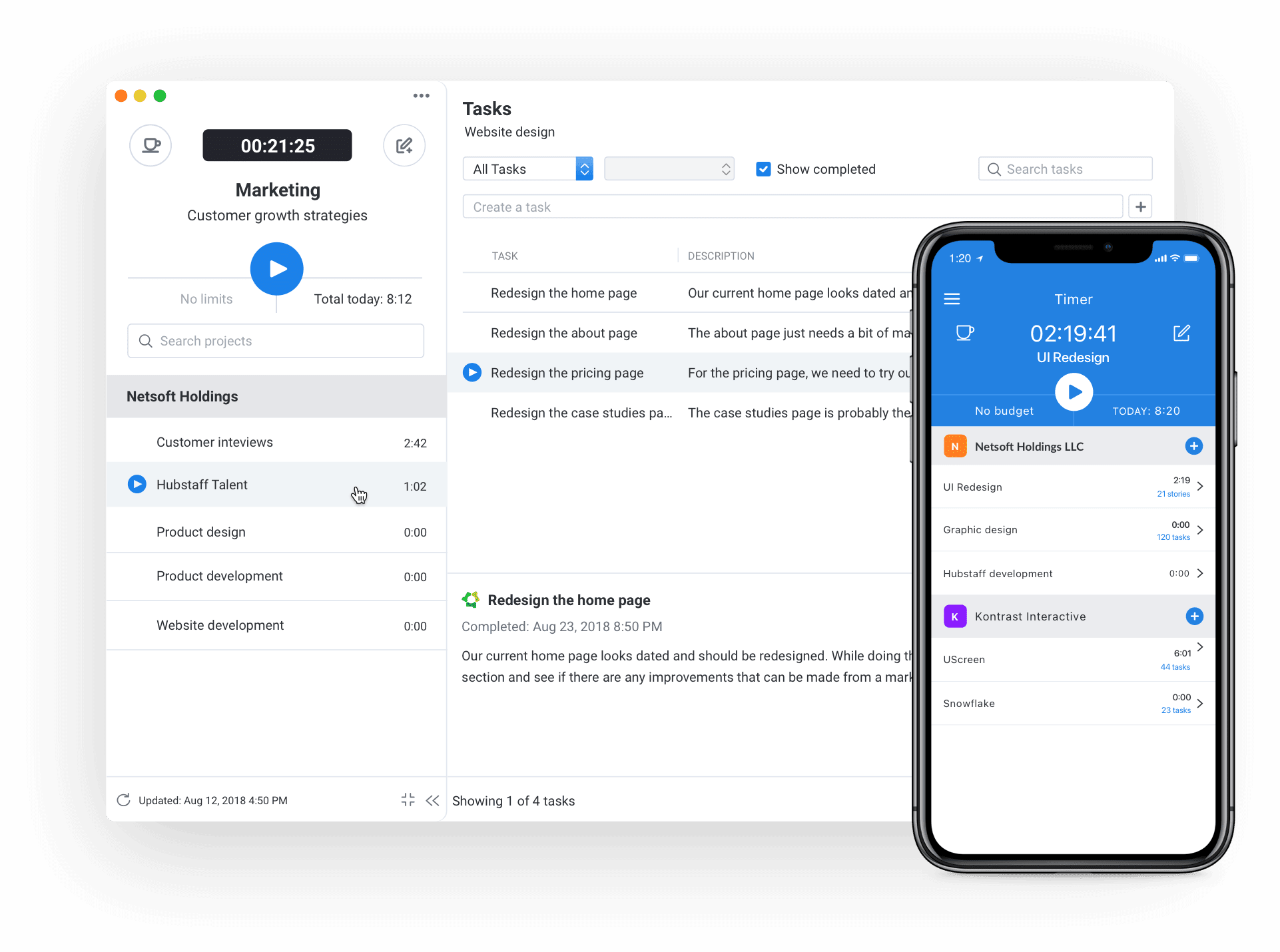
Hubstaff is a time tracking app that’s great for businesses of all sizes, but it can especially shine as a small business time tracker. Even in a basic starter plan, you’ll have access to time tracking, timesheets, invoices, and productivity features — features that other tools on this list lack at a higher price point.
Features
- Time tracking. Track time to your projects on desktop, mobile, or from your web browser. Idle timeout settings and manual time entries round out a great free time tracker for small businesses.
- Employee productivity. Gauge workloads, project spend, and the mental well-being of your employees with Hubstaff. You’ll be able to see employee activity, app and URL usage, and other real-time insights from the dashboard.
- Timesheets. Generate timesheets in real time with your time tracking data. This saves small businesses considerable time by reducing admin work for HR and employees.
- GPS/Geofenced time tracking. Are you managing workers out in the field? Create geofenced Job sites that employees can clock in and out of automatically right from the mobile time tracking app. GPS features help you plan routes and check in on your team.
- Payroll. Pay your team with Hubstaff Pay, PayPal, Wise, Payoneer, Gusto, and other payroll platforms. You can pay team members on any of these platforms right from the app.
- Project Cost Management. Gain full control over your project budgets with Hubstaff’s project cost tracking tools. Track labor costs, expenses, and overall budget allocation in real time.
- Integrations. The integrations extend far beyond payroll. Maximize workforce management with 30+ integrations with tools like Salesforce, Slack, GitHub, and QuickBooks. You can also connect Hubstaff to even more apps with Zapier.
Hubstaff also offers automated invoices and expenses, project budgeting, and detailed workforce analytics features that you can access right from the app.
Pricing
Hubstaff’s free plan works great for single users. It offers time tracking, timesheets, and even some limited payment features.
If you’re looking to grow your workforce, you can opt for one of the paid plans:
- Starter ($7 per user/month)
- Grow ($9 per user/month)
- Team ($12 per user/month)
- Enterprise ($25 per user/month)
We’ve also created additional add-ons as well:
- Insights ($2 per user/month)
- Tasks ($3 per user/month)
- Data retention ($2 per user/month)
- More screenshots ($3 per user/month)
There’s also a free 14-day trial you can use to give Hubstaff a try.
2. Toggl
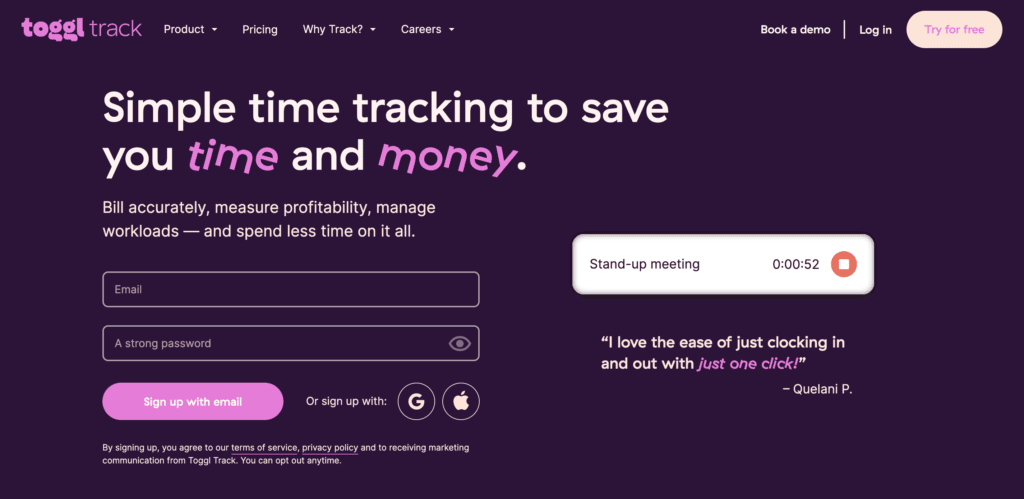
Toggl is another great time tracking solution that’s gained a lot of traction amongst small businesses and freelancers. Its beautiful, user-friendly interface makes time tracking a breeze, allowing team members to easily log hours and stay on top of their tasks.
Features
- Time tracking. Toggl allows you to track time by specific projects, employees, or tasks. This flexibility makes it highly adaptable to a wide range of business needs.
- Mobile app. The software also boasts a mobile app, enabling time entry across various devices to ensure that your team can effectively track time, even when they’re away from their desks.
- Integrations. Toggl’s seamless integration with a wide array of tools, including payroll and invoicing systems, Google Calendar, and task management tools, makes it a versatile choice for businesses looking for a comprehensive time-tracking solution.
Limitations
However, it’s essential to consider Toggl’s scalability. As your business grows, will Toggl be able to keep up and adapt to your evolving needs? You’ll need to take time to assess these factors and ensure that Toggl is the right fit for your business.
Pricing
Toggl offers a free plan with basic time tracking for unlimited projects and clients. Paid plans begin at $10 per user/month for the Starter plan. You’ll have access to features like billing rates, time rounding, and basic reporting.
3. Time Doctor
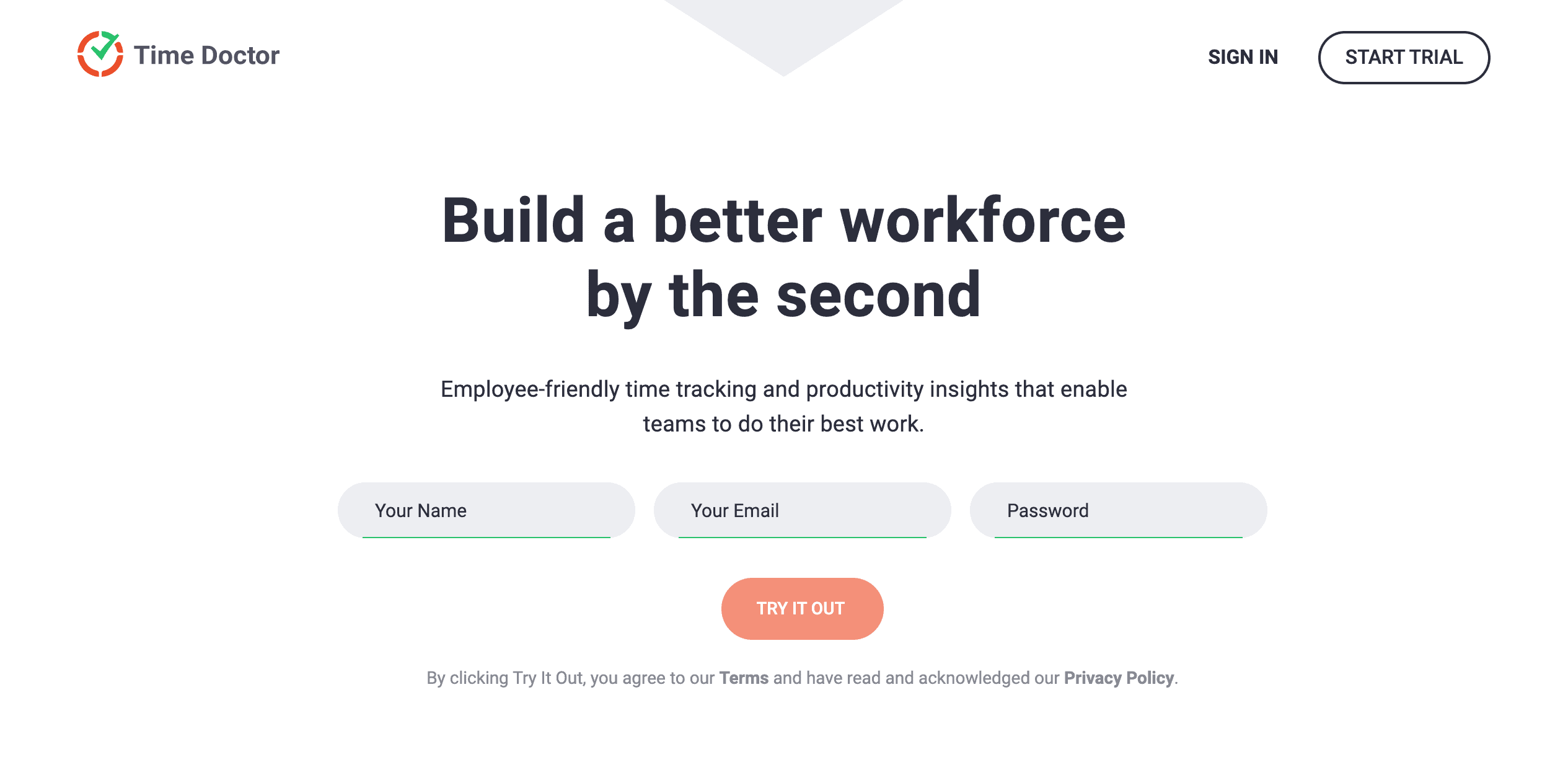
Time Doctor is a time-tracking tool that caters nicely to small businesses’ needs. Like Hubstaff, it can go a step further by providing detailed insights into how one’s time is spent. The user-friendly interface of Time Doctor ensures an effortless experience when logging hours and managing tasks.
Features
- Time tracking. Time Doctor’s time-tracking capabilities are useful, allowing for detailed tracking of time by specific projects, employees, or tasks.
- Productivity. Time Doctor offers a glimpse into your team’s productivity. This helps managers and employees alike identify areas of improvement.
- Mobile app. The Time Doctor mobile app allows users to create time entries across an array of devices.
- Integrations. One of the key strengths of Time Doctor is its ability to integrate with a wide array of other tools.
Limitations
- No free plan
- Outdated UI
- Linux and macOS issues
- Spotty customer support
Pricing
Time Doctor doesn’t have a free plan, but it does have three paid plans and a 14-day free trial to test features:
- Basic ($7 per user/month)
- Standard ($10 per user/month)
- Premium ($20 per user/month)
4. Timely
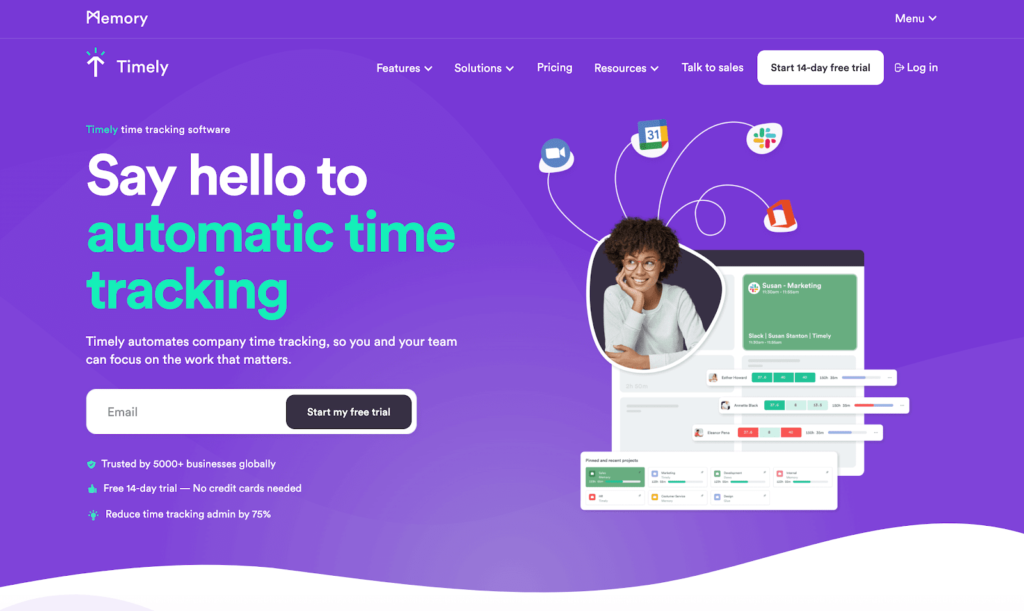
Timely is another standout in the realm of time tracking software. Designed with the specific needs of small businesses in mind, its intuitive interface makes it easy for users to log hours and manage tasks. You’ll have a streamlined process that saves your team valuable time.
Features
- Time tracking. Timely’s time-tracking capabilities are robust yet flexible. This allows for detailed tracking of specific projects, employees, or tasks.
- AI capabilities. Timely’s time tracking app can utilize AI technology to understand your work habits. Once it gets used to your habits, it can organize your time based on the task. Pretty cool!
- Mobile app. Its functionality extends to a mobile app, ensuring that your team can effectively log time across various devices, regardless of their location.
- Integrations. Like the other apps on this list, Timely offers helpful integrations with popular software.
Limitations
- No free plan
- Scalability issues
- Less manual and potentially less precise, meaning this could be an adjustment for end users
While the AI features are really cool, users expressed some issues with the app freezing and noted that it works better as a tool for solo users. If they offered a free plan, those concerns would be a bit easier to stomach. Check out a full Hubstaff vs. Timely comparison.
Pricing
Timely’s pricing is pretty similar to other tools on this list. There’s a 14-day trial you can use to test out the software. Paid plans include:
- Starter ($11 per user/month)
- Premium ($20 per user/month)
- Unlimited ($28 per user/month)
5. TimeCamp
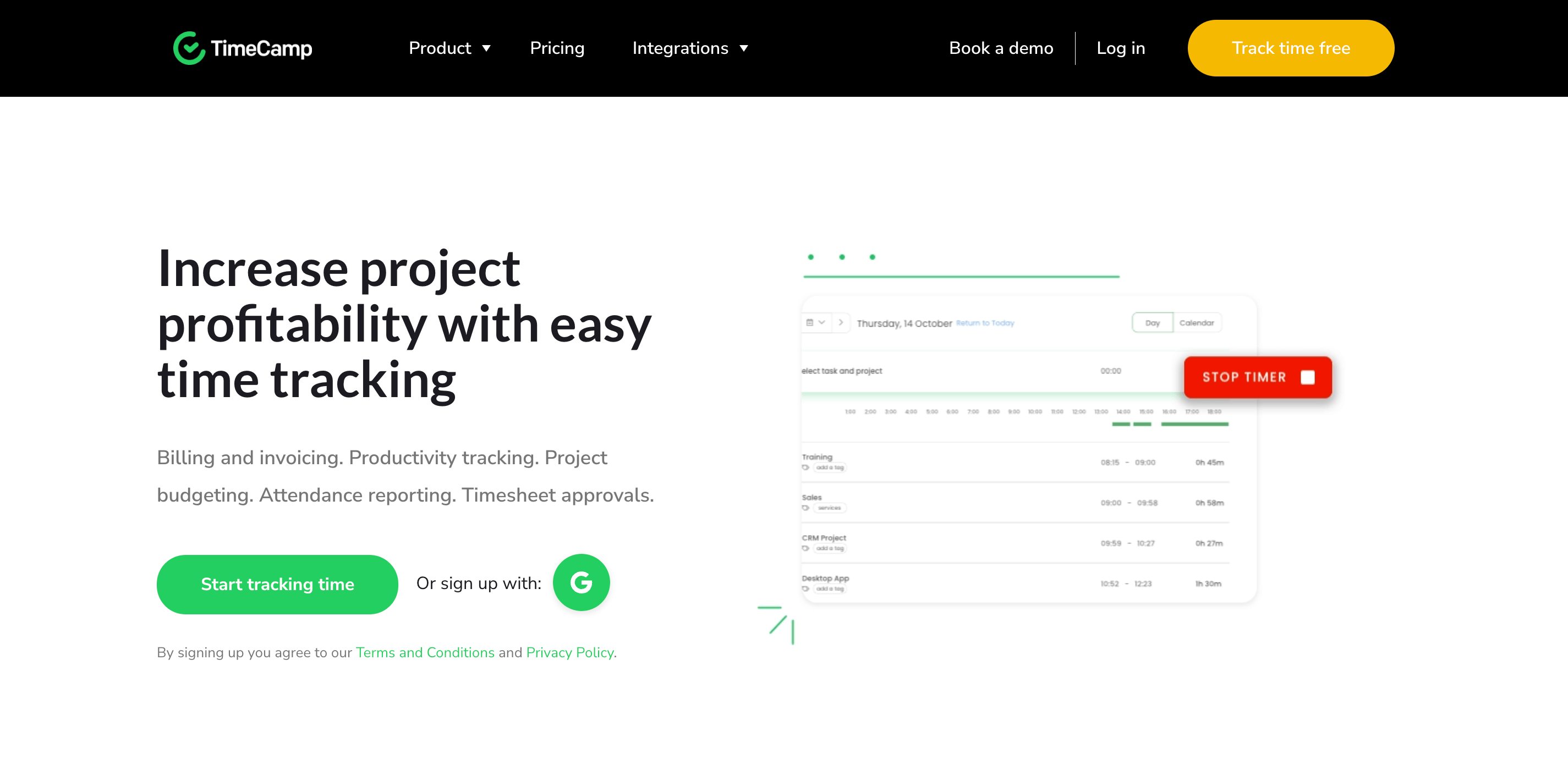
Like Timely, TimeCamp is a time tracking app that aims to help you stay organized with some cool app-grouping features. Its interface helps you log hours, manage tasks, and reduce admin time.
Features
- Time tracking. Track time by specific projects, employees, or tasks. Like Hubstaff, TimeCamp can group the apps you use into categories to gauge productivity.
- Project budgeting. Detailed project budgets are great for growing teams hoping to keep a better handle on their finances.
- Geofencing/Kiosk tool. Like Hubstaff, TimeCamp is a great time tracking solution for small businesses out in the field as well. Their geofencing and kiosk features are helpful for growing field teams.
- Integrations. Integrations with project management and invoicing tools like Asana, Trello, and QuickBooks make TimeCamp a more robust time tracking solution.
Limitations
TimeCamp is a really versatile time tracking tool at an affordable price (as you’ll see below), but users have expressed issues with the app itself. UI/UX issues and the app simply struggling to work at times have been a challenge for users.
Pricing
TimeCamp offers a limited free plan. They also have paid options:
- Starter ($3.99 per user/month)
- Basic ($6.99 per user/month)
- Pro ($10.99 per user/month)
6. Paymo
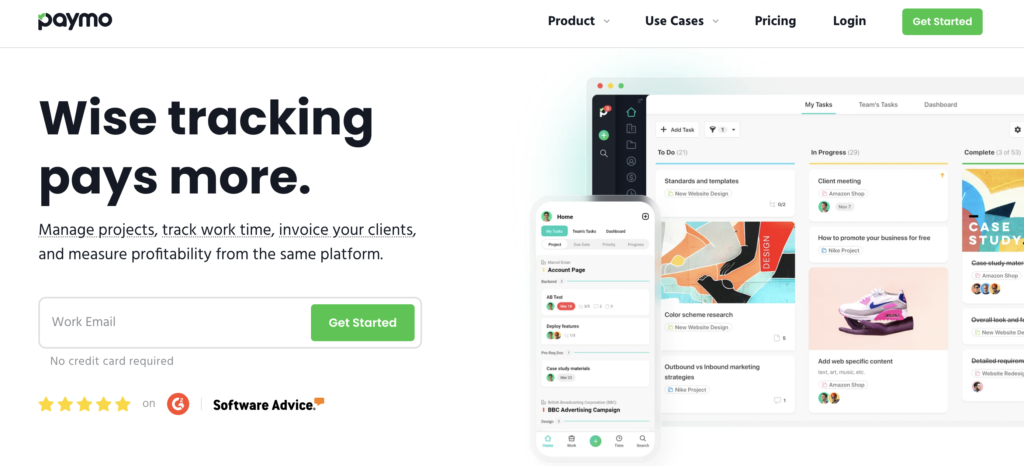
Paymo is a great time tracking tool for small businesses looking to bake in some project management capabilities. With an easy-to-use interface and a robust set of features, Paymo helps you track time to projects, manage them from multiple views, and then invoice clients accordingly.
Features
- Time tracking. Like other tools on this list, you can track time on web and mobile. What sets Paymo apart is a unique feature that lets you drag and drop time entries into a calendar to expedite payroll.
- Project management. In addition to being a great time tracker, Paymo would probably make the cut for a list of the best project management tools as well. Track time to tasks and organize work into Gantt charts, calendar views, spreadsheets, to-do lists, and more. Use templates or create custom workflows to visualize work the way you want to.
- Scheduling. Shift scheduling features are great for small businesses. Paymo’s real-time team scheduling features make it easy to organize your team. The unique automatic ghost-booking feature saves time by suggesting schedules for you based on previous data.
Limitations
Paymo is a clean, intuitive app that generally receives a lot of praise in the time tracking circle. With a name like Paymo, it’s surprising to hear users are frustrated with its inability to track the cost of projects in real time.
Pricing
- Free
- Starter ($9.90 per user/month)
- Small Office ($15.90 per user/month)
- Business ($23.90 per user/month)
7. Harvest
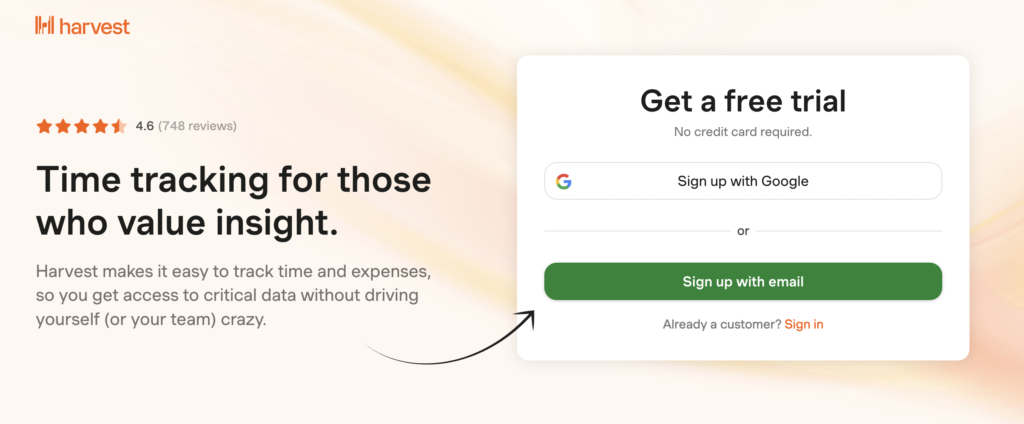
Harvest can work for organizations of any size, but it excels as a time tracker for small businesses with its low barrier to entry. You can manage projects from time tracking to invoicing with this fan-favorite tool. With 50+ integrations, it’s a seamless addition to virtually any tech stack.
Features
- Time tracking. Track time to tasks with an easy-to-use, built-in timer. The more you track, the more your timesheets start to take shape.
- Invoices. Small businesses won’t have to worry about pressing clients for payments. Convert timesheets to invoices seamlessly and collect payments with PayPal and Stripe integrations.
- Reporting. Create reports by project, team, or through integrations with your favorite tool. Great for small teams looking for more accurate project scoping, budgeting, and utilization.
Limitations
Harvest is great for small businesses, but other tools on this list continue to grow alongside you. Harvest stays in its lane with simplistic, effective features year in and year out, but it lacks an enterprise plan with more robust features.
Pricing
Harvest has one of the better free trials on this list. You’ll have 30 days of premium features to decide between a free or paid plan.
- Free Plan: Free for one user and two projects
- Pro Plan: $12 per user/month for unlimited seats and projects
8. Clockify
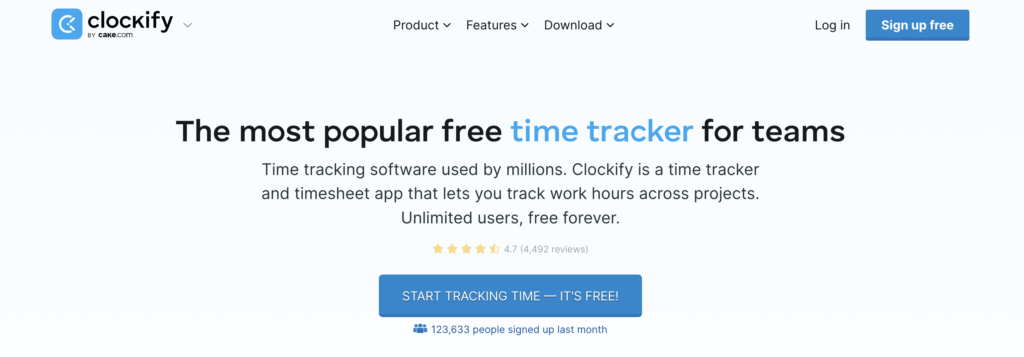
Clockify has been making waves in the time tracking space in the past few years. What started as basic, free time tracking software now offers paid plans with invoicing, reports, and productivity features.
Features
- Time tracking. Basic time tracking features make it great for those new to tracking. Track employee time with Clockify’s intuitive desktop app.
- Task management and to-do lists. A Clockify feature that’s often overlooked is the ability to track time straight to a to-do list. Basic labeling systems and manual time entries make it great for time tracking newbies.
- Reporting. A simple, intuitive dashboard is great for real-time reporting. On paid plans, you can also view and export reports for earnings, hours worked, and more.
Limitations
Clockify is great for teams just starting out, but a lot of features are locked behind a paywall. The company is primed to compete in the paid time tracking space, but they’ll likely need to offer more in their free plan (or a longer free trial) to win users over with their full feature set.
Pricing
Clockify offers a free trial, but it’s significantly shorter (seven days) than the 14 and 30-day trials you’ll see from other tools on this list. That said, their free plan is great for solopreneurs and startups. There are also a number of paid plans with time off, basic reporting, invoicing, and more.
- Basic Plan: $4.99 per user/month
- Standard Plan: $6.99 per user/month
- Pro Plan: $9.99 per user/month
- Enterprise Plan: $14.99 per user/month
Selecting time tracking software for small businesses
As your small business embarks on this search for the best time tracking software, it’s important to establish criteria that will help you in your search. Here are a few things to consider.
1. UI/UX experience. First, assess the user-friendliness of the software. It’s essential that the time tracking software is intuitive. You’ll want something that won’t require extensive training that adds more to your workload.
2. Time tracking features. Once you’ve found something that’s easy to use, you’ll need to look into the specific time tracking features. Can the tool track to specific projects or tasks? Will you need to track time offline? Will you need GPS and geofencing technology for teams out in the field?
3. Integrations. How well does the software blend with your existing tools? Can it seamlessly integrate with your favorite CRM, project management, and payroll tools? How intuitive are these integrations?
4. Scalability. You might be a small business now — but not for long! Will this tool be able to grow alongside you as you scale? Does it have the enterprise-grade security features you’ll need to make the jump?
By carefully contemplating these aspects before embarking on your search, you can ensure that you secure the best-suited time tracking software for your small business needs.
A shortlist for small teams
In conclusion, Hubstaff, Time Doctor, Timely, TimeCamp, and Paymo each offer unique strengths in the field of time-tracking software. They all provide comprehensive time-tracking capabilities, intuitive interfaces, and seamless integration with other tools, making them exemplary choices for small businesses. However, the scalability of these tools must be considered as your business grows.
The important thing to remember is that each of these tools is effective in its own unique way. That leaves you with a little homework to find the right time tracking software for your team. By clearly identifying your specific requirements and understanding the nuances of each tool, you can make the right decision for your business.
Have any good time trackers for small businesses that you’re using? Struggling to grow your business on the workforce management front? Share your thoughts in the comments and check out more of our content.
Most popular
The Critical Role of Employee Monitoring and Workplace Security
Why do we need employee monitoring and workplace security? Companies had to adapt fast when the world shifted to remote work...
15 Ways to Use AI in the Workforce
Whether through AI-powered project management, strategic planning, or simply automating simple admin work, we’ve seen a dramatic...
The AI Productivity Panel: Lessons From Leaders on What’s Working (and What’s Not)
When I moderated this AI productivity panel, I expected a solid conversation. What I didn’t expect was the flood of real-world i...
Employee Performance Dashboards: Templates, Tools, and Best Practices
Keeping track of how your team’s really doing can be tricky. Spreadsheets pile up, one-on-ones only tell part of the story, and...




